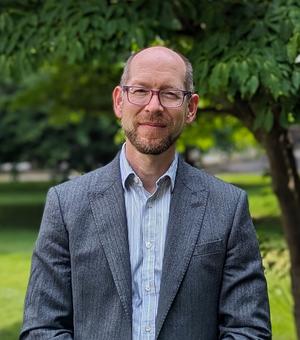Professor Andrew Davison
Research Interests:
Christian doctrine; Thomas Aquinas; the scholastic tradition; participation and mediation as metaphysical themes in Christian theology; the relation of doctrines; theological responses to aspects of natural science and technology, especially contemporary biology and artificial intelligence / machine learning.
Research Centres & Projects:
Founding member of the Leverhulme Centre for Life in the Universe, University of Cambridge
Fellow in UK FIRES programme (Climate change research network), University of Cambridge
Editorships:
Cambridge Elements in Christianity and Science
Cambridge Elements in the Origins of Life
Theology, Philosophy, and the Sciences
Current Projects:
The origin of life as a topic for Christian theology
The relation of doctrines in Christian theology
Mediation as a metaphysical category in Christian doctrine
The theological implications of recent developments in biology
The application of scholastic metaphysics to aspects of Artificial Intelligence / Machine Learning
Restraint and climate change
Courses Taught:
Key Themes in Systematic Theology
MSt in Christian Doctrine
MPhil in Christian Doctrine
Biography:
My first spell at Oxford was as an undergraduate reading Chemistry, followed by a DPhil in Biochemistry. I subsequently read theology at Cambridge. After a curacy in Southeast London, I started my theological teaching and research career in Oxford, as tutor in Christian doctrine at St Stephen’s House, followed by a similar role at Westcott House in Cambridge. During that time, I studied a Cambridge PhD on understandings of finitude in Thomas Aquinas and John Duns Scotus. I moved from Westcott House to become the Starbridge Lecturer (later Professor) in Theology and Natural Sciences at the University of Cambridge (2014–24). From 2022–24, I was a visiting fellow at the Center of Theological Inquiry in Princeton, New Jersey. I became Regius Professor of Divinity at Oxford in September 2024, a post that is based at Christ Church, where I am also a residentiary canon of the cathedral.
Educational Background:
University of Oxford, MA, Chemistry
University of Oxford, DPhil, Biochemistry
University of Cambridge, MA, Theology and Religious Studies
University of Cambridge, PhD, Mediaeval Theology (Faculty of Divinity)
Recent Publications:
Julian Allwood and Andrew Davison, Promise the Earth: A Safe Climate in Good Faith. Cambridge, 2026.
‘"Tools Are for the Worker", Machine Learning as an Instrumental Cause', Theology, Philosophy and the Sciences, 11, no. 2 (2024): 158–80, doi:10.1628/ptsc-2024-001
‘Deification and the Metaphysics of Participation’ in Oxford Handbook of Deification. Edited by Paul Gavrilyuk, Andrew Hofer, and Matthew Levering. Oxford: Oxford University Press. 2024.
Astrobiology and Christian Doctrine: Exploring the Implications of Life in the Universe. Cambridge University Press. 2023.
‘Participation in the Christian Doctrinal and Philosophical Tradition’, St Andrews Encyclopaedia of Theology. Edited by Brendan N. Wolfe et al. 2023. https://www.saet.ac.uk/Christianity/Participation
‘Participation and Nature in Christian Theology’. In The Cambridge Companion to Christianity and the Environment, edited by Alexander Hampton and Douglas Hedley, 80– 95. Cambridge: Cambridge University Press. 2022.
New or revised entries – including ‘Dualism’, ‘Life’, ‘Form’, ‘Hylomorphism’, ‘Participation’, ‘Thomism’, and ‘Science and Religion’ – in The Oxford Dictionary of the Christian Church. Edited by F. L. Cross, E. A. Livingstone, and A Louth, Fourth. Oxford: Oxford University Press. 2022.
‘More History, More Theology, More Philosophy, More Science: The State of Theological Engagement with Science’. In New Directions in Theology and Science: Beyond Dialogue. Edited by Peter Harrison and Paul Tyson. London: Bloomsbury. 2022.
‘Machine Learning and Theological Traditions of Analogy’. Modern Theology 37, no. 2 (April 2021): 254–74.
Participation: An Exploration in Christian Doctrine and Metaphysics. Cambridge: Cambridge University. 2019.



